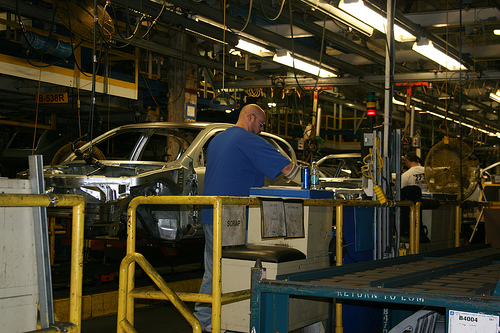With the Big Three US auto makers begging the US government to bail them out of bankruptcy, there have been many images on TV and in newspapers of American auto workers at the production line. I watched closely and unconsciously compared them with images of Chinese and Japanese workers, mostly from the same media outlets. My brain computed a couple of differences between images of American and Chinese industrial workers. The most striking difference is that the American workers at the big three auto plants were not wearing uniforms. I saw many t-shirts and jeans on the floor, of different colors, styles and designs. Some of the workers’ clothing bore writings of little relevance to the work environment, the work they were doing or their identity as participants in the production process. I saw sneakers on the workers’ feet, but no hat on their heads. The Chinese and Japanese workers I saw on TV wore uniform, complete with matching hats that seemed to be fashioned after the American baseball hat. The Chinese preferred color for workers’ uniforms seems to be sky blue. The Japanese preferred color seems to be light brown. I understand the American culture of individualism and personal expression.

However, when you are working at a billion dollar plant, you need to have some focus, and conduct yourself differently than working in your backyard on a Sunday afternoon. Anther difference between American and Chinese workers I noticed in the images is the way they work. The Chinese workers apply their mind and body, mental and physical energy to their work. This attitude shows up in the speed, precision and efficiency of their body movements, especially hand-eye coordination, and the focus and application in their facial expressions. In the Japanese workers, I see an additional element in their attitude, pride. In the American workers, I see some indifference, some disinterest. They are just going through the movements, like poorly programmed robots. Of course this is no a new observation. In the 1990s the Chairmen of Toyota and Honda got their companies into big trouble with the American congress for unflattering remarks about Americans’ inability to make good cars because of their workers’ poor work ethics. They hurt the feelings of the American people. I think the Japanese proved themselves right in that Americans have been unable to make good cars. But they are wrong in attributing the cause to the American work ethics. I say this because I have seen my American students work very hard outside of school, collecting tickets at theaters, bagging groceries, checking out customers at Wal-Mart etc. As a group, mainstream Americans’ work ethics is as good as any group I have seen, including the Chinese. I think part of the cause of the poor performance of the American manufacturing sector is that in the US professionalism is monopolized by people with “professional” jobs, doctors and airplane pilots, but does not generalize to industrial workers (the so called blue collar). I see this differential distribution of professionalism in the two countries in my recent trips to China. The difference starts at the border control. The American immigration officer that checked my passport greeted me with a boredom that clearly suggested he or she was meant for something much better than what he/she was doing. On the other hand, the Chinese officers at Beijing and Shanghai airports greeted me with enthusiasm and smiles. This impression continued in my travel in China. On the D-trains from Beijing to Shanghai the young women conductors with the soft Shanghai accent were much more professionally groomed, spoken, uniformed, capped and responsive than the stewardesses of United Airlines flying from Chicago to Beijing. I was also impressed by the police officer onboard the train that walked through the corridor urging the passengers to wake up and watch their bags when the train approached every station. Of course my observations are incomplete and biased because they are anecdotal. I admit that. My impression is that in China and much of East Asia ordinary people take their work seriously and with a sense of pride. In the US only people with “professional” jobs approach their work with professionalism.
American workers can call their Chinese counterparts “cheap” and blame them for taking away jobs. But my question to the American workers is “are you really worth that much, judging by the way you work?” Capitalism will make the final judgment. We shall see.
Warning:The use of any news and articles published on eChinacities.com without written permission from eChinacities.com constitutes copyright infringement, and legal action can be taken.
All comments are subject to moderation by eChinacities.com staff. Because we wish to encourage healthy and productive dialogue we ask that all comments remain polite, free of profanity or name calling, and relevant to the original post and subsequent discussion. Comments will not be deleted because of the viewpoints they express, only if the mode of expression itself is inappropriate.
Please login to add a comment. Click here to login immediately.